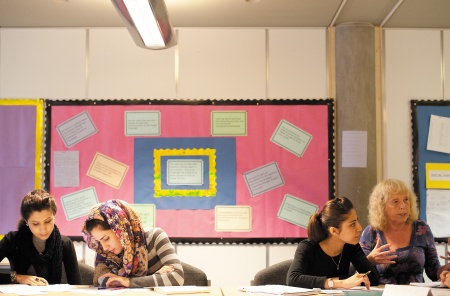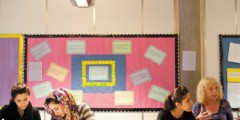What’s in a word?
April 11, 2014
Dave Willis, a pioneer of Task Based Learning in Language teaching, wrote “Fluent language use depends not simply on knowing a lot of words, but also on knowing a lot about a lot of words” (as quoted recently by @scottthornbury) What did he mean? Well let’s take the word “analyse” What do you need to …
Does language influence thought?
March 22, 2014
There is a TED video where a second generation Vietnamese immigrant suggests that his view of life is different to his parents because Vietnamese doesn’t have a subjunctive, and English does. This allows him the luxury of speculating and imagining, as well as adding layers of subtlety to his language, whereas his parents speak directly …
Pushing the envelope
February 25, 2014
In Michael Rosen‘s recent book, he talks about how he was taught to address envelopes when he was a schoolboy in the 50s and 60s. He describes in great deal the care that had to be taken with the placement of commas, the alignment of the text, and the fact that it was obligatory to end a man’s (not …
CEFR on Malaysian shores
February 13, 2014
The Common European Framework of Reference (CEFR) is widely used in Europe to describe language proficiency. CELE tutor, Salomy Krishna, recently attended a symposium to discuss whether it should be implemented in Malaysia. Below are her thoughts. In its ongoing efforts to transform language education in Malaysia, the Ministry of Education has over the years implemented many changes, some controversial …
A Vicious Cycle (Part Two)
December 3, 2013
Yan Lai Peen continues her discussion of the Human Capital that a sound knowledge of English can provide In the last blog post, I wrote about the necessity of knowing when to use standard grammar as an educator and asserted that an educational institution is where students acquire linguistic capital, especially if it is a …
A Vicious Cycle
November 13, 2013
One of the CELE staff teaching , Yan Lai Peen reflects on the teaching of English in Malaysia, and the human capital it can provide…….. In the previous blog entry, the writer considers the gaps in the recent EF English Proficiency Index, in which Malaysia ranks 11th in the world. However, merely two months ago, …
Reading Between the Headlines and Getting the Plot (Part 2)
October 18, 2013
In my previous blog post, I had emphasised that being effective readers requires more than merely understanding words – the ability to identify the writer’s implicit beliefs and bias is also very important. I once read an article in the “women’s section” of a local newspaper where the writer stated as fact that women “always …
Taking part in discussions
October 9, 2013
Some students find it difficult to take part in discussions, especially in English, and especially about complicated subjects. However, discussion is like many things, the more you put in, the more you get out. Below are some tips from the CELE senior tutor, Melissa Yoong, about what to do if this applies to you 1. …
A new self study resource
September 25, 2013
The British Council has a resource at http://learnenglish.britishcouncil.org/en/writing-purpose/introduction to help academic writers Based on extensive analysis of large collections of Academic Writing from British Universities, it helps students at all levels meet the expectations of academic writing.
What is “Proper” English? Part Two
September 10, 2013
In the previous post, I asked the question “What is proper English”? The English spoken around the world differs in many ways- Americans write “color” and pronounce the final “r”- the English write “Colour” and the “r” is silent. There are also plenty of examples of similar differences between Malaysian English and British English- grammatical …








Recent Comments